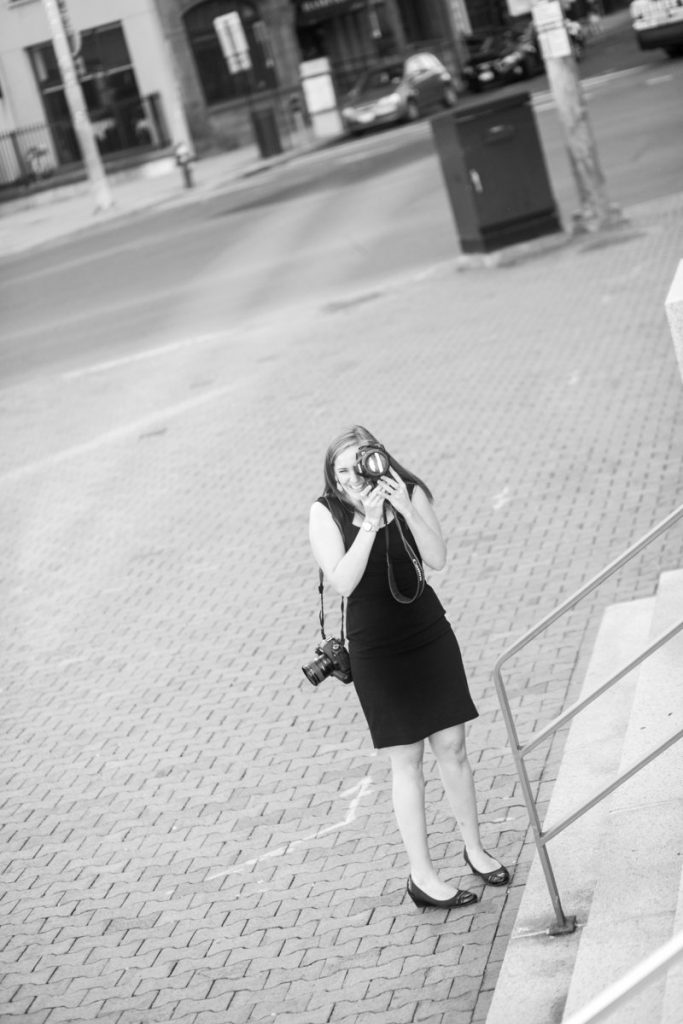If you’re starting out as a second shooter for weddings, there are two lenses you should invest in. I’m a lover of prime lenses and will always recommend those first. But this situation is a bit different. Zoom lenses are perfect for photographers who are just starting out. You essentially get multiple camera lenses in one rather than buying 4 or 5 lenses. Here are the two essential lenses for second shooters and beginner wedding photographers.
24-70mm lens
The first camera lens I highly recommend for second shooters is the 24-70mm. Look for this lens that has a low aperture like f/2.8. You’ll often see a 24-70mm f/4 but try to go lower if you can by purchasing one at f/2.8. Often second photographers will be in tight getting ready rooms with little space to work in. Having a wide lens is essential for smaller spaces. The 24-70mm also comes in handy when photographing groups of people, such as the groomsmen or during cocktail hour. Trying to take group photos when all you have is a longer lens is nearly impossible in a narrow area.
The handy 24-70mm lens is perfect for getting beautiful wide shots during the ceremony. It also crushes dancing photos using a little distortion to create fun party vibes! Using the zoom function at 70mm gives you more compression giving you a dreamier and less distorted image. Especially when using a lower aperture. Shooting at 50 to 70mm works perfectly when doing portraits of the couple or just the Groom himself.
I shoot with Canon gear and this is the lens I recommend – Canon 24-70mm f/2.8. You can also use the Sigma version of this which tends to be a little less expensive but also works great – Sigma 24-70mm f/2.8 for Canon
70-200mm lens
The second of the two camera lenses for second shooters I highly recommend is the 70-200mm. This lens is a beast! You need a long lens on weddings days for a few reasons. During the ceremony when you are shooting from either side of the pews or seats a wide lens won’t cut it. The 70-200mm is awesome for candid photos during cocktail hour as well as reaction shot throughout the reception during dances and speeches.
Using the 70-200mm is going to add some pounds to your camera so be prepared for that. But it’s necessary for wedding photographers to have a longer lens in their bag. The compression on this bad boy is impressive and will probably become your favorite rather quickly. Being able to zoom in to 200mm is a game changer! You’ll want to make sure you’re purchasing a lens with a lower aperture than 4 as well. Ideally you’d add a 70-200mm f/2.8 to your gear.
Here is the Canon lens I recommend Canon 70-200mm f/2.8 . There is a Sigma version for it as well – Sigma 70-200mm f/2.8.

Zoom Lenses vs Prime Lenses
Like I said, I’ll always prefer a prime lens over a zoom lens. But if you are a beginner, zoom lenses are the way to go. That’s exactly what I did when I first started out! The more experience I had and the more weddings I booked, the more I was able to upgrade my equipment. Prime lenses offer lower apertures like f/1.2 and f/1.4 which fit perfectly with my style of photography! The difference between f/2.8 and f/1.2 are pretty significant and well worth the investment down the road. However, zoom lenses allow you to have less gear and do more with the gear that you have. Being able to stand in one spot and take a wide shot and a tight shot with the flick of your wrist is really convenient.
My current gear consists of all Sigma Art prime lenses and I’m in love with them!
Sigma Art 35mm F1.4
Sigma Art 50mm f/1.4
Sigma Art 85mm f/1.4 (My all time favorite lens!)
Canon 135mm (This lens is discontinued. The Sigma ART 135mm f/1.8 is an incredible replacement)
Canon Macro 50mm (this lens is also discontinued but the Canon 100mm f/2.8 Macro is the next best thing!)
If you’re looking some lenses for second shooters, start with a 24-70mm f/2.8 and a 70-200mm f/2.8.
Be the first to comment